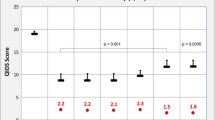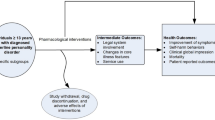Abstract
Background
Bipolar disorder and schizophrenia are severe mental illnesses, each with a prevalence of approximately 1–2% in the general population. There is considerable controversy about differentiating schizophrenia from schizoaffective or bipolar disorder owing to many similarities in psychopathology, progression, and biological factors. The aim of this study was to identify similarities and differences in the pharmacological treatment of these disorders by comparing the prescription patterns.
Method
In this retrospective, explorative study we analyzed the prescribed medication of 300 patients with bipolar, schizophrenic, or schizoaffective disorders from data obtained from ten German adult psychiatric clinics of the LWL (“Landschaftsverband Westfalen-Lippe”) psychiatric network.
Results
Only 21.8% of patients analyzed were consistently compliant in taking their medication before hospitalization. Polypharmacy was applied in 75.6% of cases, whereby 2.27 psychopharmacological agents were prescribed at discharge. Briefly, we observed greater similarity between prescription patterns associated with bipolar and schizoaffective disorders than with schizophrenia prescription patterns.
Conclusion
Polypharmacy tends to be more the rule than the exception, especially when patients present with affective psychotic features. Bipolar and schizoaffective disorders cannot be differentiated according to their prescription patterns.
Zusammenfassung
Hintergrund
Bipolare und schizophrene Störungen sind sehr schwere und bei einer Prävalenz von 1–2 % in der Allgemeinbevölkerung auch häufige psychische Erkrankungen. Aufgrund zahlreicher Gemeinsamkeiten zwischen Schizophrenien, schizoaffektiven und bipolaren Störungen hinsichtlich der Psychopathologie, dem Verlauf sowie der biologischen Grundlage wird eine klare Trennung dieser Entitäten kontrovers diskutiert. Der im Rahmen dieser Studie durchgeführte Vergleich der Verordnungsgewohnheiten in verschiedenen Kliniken hatte das Ziel, Hinweise auf eine differenzielle Pharmakotherapie dieser Störungen aufzudecken.
Methodik
In dieser retrospektiven, explorativen Studie wurde das medikamentöse Verordnungsverhalten bei bipolaren, schizophrenen bzw. schizoaffektiven Störungen bei insgesamt 300 Patienten aus 10 Kliniken des LWL-Psychiatrieverbunds untersucht.
Ergebnisse
Nur 21,8 % der insgesamt in die Studie eingeschlossenen Patienten zeigten eine befriedigende Compliance in der Medikamenteneinnahme vor dem stationären Aufenthalt. Polypharmazie lag bei 75,6 % der Patienten vor, im Mittel bestand eine Verordnung für 2,27 psychotrope Medikamente bei Entlassung. Zusammenfassend ähnelt das Verschreibungsverhalten bei bipolaren Störungen eher demjenigen bei schizoaffektiven Störungen als dem bei Schizophrenie.
Schlussfolgerung
Polypharmazie ist eher die Regel als die Ausnahme, besonders beim Vorliegen affektiver und psychotischer Merkmale. Im klinischen Verordnungsverhalten sind bipolare Störungen und schizoaffektive Störungen kaum zu unterscheiden.




Similar content being viewed by others
References
Cheniaux E, Landeira-Fernandez J, Lessa Telles L et al (2008) Does schizoaffective disorder really exist? A systematic review of the studies that compared schizoaffective disorder with schizophrenia or mood disorders. J Affect Disord 106(3):209–217
Patel K, Cherian J, Gohil K et al (2014) Schizophrenia:overview and treatment options. P T 39(9):638–645
Hasan A, Falkai P, Wobrock T et al (2012) World Federation of Societies of Biological Psychiatry (WFSBP) guidelines for biological treatment of schizophrenia, part 1: update 2012 on the acute treatment of schizophrenia and the management of treatment resistance. World J Biol Psychiatry 13:318–378
Hasan A, Falkai P, Wobrock T et al (2013) World Federation of Societies of Biological Psychiatry (WFSBP) guidelines for biological treatment of schizophrenia, part 2: update 2012 on the long-term treatment of schizophrenia and management of antipsychotic-induced side effects. World J Biol Psychiatry 14:2–44
National Institute for Health and Clinical Excellence (NICE) (2012) Core interventions in the treatment and management of schizophrenia in primary and secondary care (update). http://www.nice.org.uk/nicemedia/live/11786/43607/43607.pdf. Accessed: 15 Feb 2018
Längle G, Steinert T, Weiser P et al (2012) Effects of polypharmacy on outcome in patients with schizophrenia in routine psychiatric treatment. Acta Psychiatr Scand 125:372–381
Wolff-Menzler C, Hasan A, Malchow B et al (2010) Combination therapy in the treatment of schizophrenia. Pharmacopsychiatry 43(4):122–129
Assion H, Reinbold H, Lemanski S et al (2008) Amisulpride augmentation in patients with schizophrenia partially responsive or unresponsive to clozapine. A randomized, double-blind, placebo-controlled trial. Pharmacopsychiatry 41(1):24–28
Correll CU, Rummel-Kluge C, Corves C et al (2009) Antipsychotic combinations vs monotherapy in schizophrenia: a meta-analysis of randomized controlled trials. Schizophr Bull 35(2):443–457
Farahani A, Correll CU (2012) Are antipsychotics or antidepressants needed for psychotic depression? A systematic review and meta-analysis of trials comparing antidepressant or antipsychotic monotherapy with combination treatment. J Clin Psychiatry 73(4):486–496
Ogawa Y, Tajika A, Takeshima N et al (2014) Mood stabilizers and antipsychotics for acute mania: a systematic review and meta-analysis of combination/augmentation therapy versus monotherapy. CNS Drugs 28(11):989–1003
Calabrese JR, Bowden CL, Sachs GS et al (1999) A double-blind placebo-controlled study of lamotrigine monotherapy in outpatients with bipolar I depression. Lamictal 602 Study Group. J Clin Psychiatry 60(2):79–88
Galling B et al (2017) Antipsychotic augmentation vs. monotherapy in schizophrenia: systematic review, meta-analysis and meta-regression analysis. World Psychiatry 16:77–89
S3-Leitlinie—Diagnostik und Therapie bipolarer Störungen. Berlin: Springer; 2013. pp. 474
Kendall T et al (2014) Assessment and management of bipolar disorder: summary of updated. NICE guidance. BMJ 349:g5673
Geddes JR, Calabrese JR, Goodwin GM (2009) Lamotrigine for treatment of bipolar depression: independent meta-analysis and meta-regression of individual patient data from five randomised trials. Br J Psychiatry 194(1):4–9
Bond DJ, Lam RW, Yatham LN (2010) Divalproex sodium versus placebo in the treatment of acute bipolar depression: a systematic review and meta-analysis. J Affect Disord 124(3):228–234
Young AH, McElroy SL, Bauer M et al (2010) A double-blind, placebo-controlled study of quetiapine and lithium monotherapy in adults in the acute phase of bipolar depression (EMBOLDEN I). J Clin Psychiatry 71(2):150–162
Calabrese JR, Keck PE, Macfadden W et al (2005) A randomized, double-blind, placebo-controlled trial of quetiapine in the treatment of bipolar I or II depression. Am J Psychiatry 162(7):1351–1360
Thase ME, Jonas A, Khan A et al (2008) Aripiprazole monotherapy in nonpsychotic bipolar I depression: results of 2 randomized, placebo-controlled studies. J Clin Psychopharmacol 28(1):13–20
Wang M, Tong J, Huang D et al (2014) Efficacy of olanzapine monotherapy for treatment of bipolar I depression: a randomized, double-blind, placebo controlled study. Psychopharmacology (Berl) 231(14):2811–2818
Rapoport S, Basselin M, Kim H et al (2009) Bipolar disorder and mechanisms of action of mood stabilizers. Brain Res Rev 61(2):185–209
Shim IH, Woo Kim YSMD et al (2017) Antidepressants and mood stabilizers: novel research avenues and clinical insights for bipolar depression. Int J Mol Sci 18(11):E2406. https://doi.org/10.3390/ijms18112406
Baethge C (2003) Long-term treatment of schizoaffective disorder: review and recommendations. Pharmacopsychiatry 36(2):45–56
Günther W, Noegel T, Trapp W et al (2008) Verordungsgewohnheiten von Psychopharmaka an deutschen Psychiatrischen Krankenhäusern. Teil I: Antipsychotika. Psychopharmakotherapie 15(5):202–208
Laux G, Artmann S, Günther W et al (2008) Verordungsgewohnheiten von Psychopharmaka an deutschen Psychiatrischen Krankenhäusern. Teil III Antidepressiva. Psychopharmakotherapie 15(6):265–271
Messer T, Meyer zur Capellen K, Trapp W et al (2009) Psychopharmaka an deutschen Psychiatrischen Krankenhäusern. Teil V: Antimanika und Stimmungsstabilisierer (Mood-Stabilizer). Psychopharmakotherapie 16(4):161–169
Tseng PT, Chen YW, Chung W et al (2016) Significant effects of valproate augmentation therapy in patients with schizophrenia. Medicine (Baltimore) 95(4):1–10
González-Pinto A, Reed C, Novick D et al (2010) Assessment of medication adherence in a cohort of patients with bipolar disorder. Pharmacopsychiatry 43:263–270
Maeda K, Kasai K, Watanabe A et al (2006) Effect of subjective reasoning and neurocognition on medication adherence for persons with schizophrenia. Psychiatr Serv 57:1203–1205
Johnson FR, Ozdemir S, Manjunath R et al (2007) Factors that affect adherence to bipolar disorder treatments: a stated-preference approach. Med Care 45:545–552
Coldham EL, Addington J, Addington D (2002) Medication adherence of individuals with a first episode of psychosis. Acta Psychiatr Scand 106:286–290
Weinbrenner S, Assion H, Stargardt T et al (2009) Drug prescription patterns in schizophrenia outpatients: analysis of data from a German health insurance fund. Pharmacopsychiatry 42(2):66–71
Park E, Amatya S, Kim M et al (2013) Long-acting injectable formulations of antipsychotic drugs for the treatment of schizophrenia. Arch Pharm Res 36(6):651–659
Pagel T, Baldessarini RJ et al (2013) Characteristics of patients diagnosed with schizoaffective disorder compared with schizophrenia and bipolar disorder. Bipolar Disord 15(3):229–239
Acknowledgements
We wish to thank Dr. Stefan Bender, Dr. Christos Chrysanthou, Prof. Dr. Georg Juckel, Prof. Dr. Klaus-Thomas Kronmüller, Dr. Josef Leßmann, PD Dr. Gerhard Reymann, Dr. Luc Turmes, Prof. Dr. Ulrich Trenckmann, PD Dr. Bernward Vieten from the LWL-PsychiatrieVerbund (LWL psychiatric network) for access to patients’ data, Carole Cürten for her kind support regarding the English translation of this paper, and Dr. Bianca Ueberberg for her thorough revision of the text
Author information
Authors and Affiliations
Corresponding author
Ethics declarations
Conflict of interest
H.-J. Assion, A. Schweppe, H. Reinbold, and U. Frommberger declare that they have no competing interests.
All procedures performed in studies involving human participants were in accordance with the ethical standards of the institutional and/or national research committee and with the 1964 Helsinki declaration and its later amendments or comparable ethical standards. Informed consent was obtained from all individual participants included in the study.
Rights and permissions
About this article
Cite this article
Assion, HJ., Schweppe, A., Reinbold, H. et al. Pharmacological treatment for schizoaffective disorder. Nervenarzt 90 (Suppl 1), 1–8 (2019). https://doi.org/10.1007/s00115-018-0507-3
Published:
Issue Date:
DOI: https://doi.org/10.1007/s00115-018-0507-3




